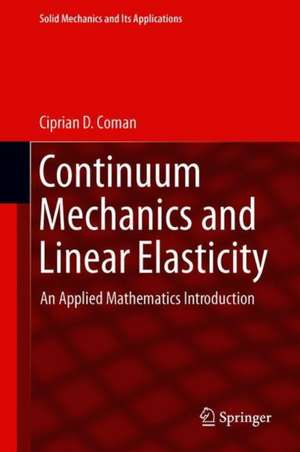Continuum Mechanics and Linear Elasticity: An Applied Mathematics Introduction: Solid Mechanics and Its Applications, cartea 238
Autor Ciprian D. Comanen Limba Engleză Hardback – 15 noi 2019
This is an intermediate book for beginning postgraduate students and junior researchers, and offers up-to-date content on both continuum mechanics and elasticity. The material is self-contained and should provide readers sufficient working knowledge in both areas. Though the focus is primarily on vector and tensor calculus (the so-called coordinate-free approach), the more traditional index notation is used whenever it is deemed more sensible.
With the increasing demand for continuum modeling in such diverse areas as mathematical biology and geology, it is imperative to have various approaches to continuum mechanics and elasticity. This book presents these subjects from an applied mathematics perspective. In particular, it extensively uses linear algebra and vector calculus to develop the fundamentals of both subjects in a way that requires minimal use of coordinates (so that beginning graduate students and junior researchers come to appreciate the power of the tensor notation).
Din seria Solid Mechanics and Its Applications
- 20%
 Preț: 698.10 lei
Preț: 698.10 lei - 24%
 Preț: 800.16 lei
Preț: 800.16 lei -
 Preț: 402.14 lei
Preț: 402.14 lei - 15%
 Preț: 640.06 lei
Preț: 640.06 lei - 15%
 Preț: 653.14 lei
Preț: 653.14 lei - 18%
 Preț: 1124.92 lei
Preț: 1124.92 lei - 15%
 Preț: 643.84 lei
Preț: 643.84 lei - 18%
 Preț: 1119.38 lei
Preț: 1119.38 lei - 20%
 Preț: 573.20 lei
Preț: 573.20 lei - 18%
 Preț: 1607.92 lei
Preț: 1607.92 lei - 17%
 Preț: 393.72 lei
Preț: 393.72 lei - 17%
 Preț: 459.41 lei
Preț: 459.41 lei - 18%
 Preț: 959.98 lei
Preț: 959.98 lei - 18%
 Preț: 747.71 lei
Preț: 747.71 lei -
 Preț: 388.55 lei
Preț: 388.55 lei - 18%
 Preț: 787.15 lei
Preț: 787.15 lei -
 Preț: 406.25 lei
Preț: 406.25 lei - 15%
 Preț: 639.08 lei
Preț: 639.08 lei - 24%
 Preț: 784.84 lei
Preț: 784.84 lei - 15%
 Preț: 643.34 lei
Preț: 643.34 lei - 18%
 Preț: 958.07 lei
Preț: 958.07 lei - 18%
 Preț: 1228.15 lei
Preț: 1228.15 lei - 18%
 Preț: 734.27 lei
Preț: 734.27 lei - 18%
 Preț: 1233.06 lei
Preț: 1233.06 lei - 18%
 Preț: 1236.19 lei
Preț: 1236.19 lei - 18%
 Preț: 950.96 lei
Preț: 950.96 lei - 18%
 Preț: 906.48 lei
Preț: 906.48 lei - 18%
 Preț: 964.54 lei
Preț: 964.54 lei - 20%
 Preț: 995.75 lei
Preț: 995.75 lei - 18%
 Preț: 953.65 lei
Preț: 953.65 lei - 18%
 Preț: 1239.67 lei
Preț: 1239.67 lei - 18%
 Preț: 962.35 lei
Preț: 962.35 lei - 18%
 Preț: 964.54 lei
Preț: 964.54 lei - 18%
 Preț: 913.11 lei
Preț: 913.11 lei - 18%
 Preț: 1226.90 lei
Preț: 1226.90 lei
Preț: 658.55 lei
Preț vechi: 774.76 lei
-15% Nou
Puncte Express: 988
Preț estimativ în valută:
126.02€ • 134.75$ • 105.07£
126.02€ • 134.75$ • 105.07£
Carte tipărită la comandă
Livrare economică 18 aprilie-02 mai
Preluare comenzi: 021 569.72.76
Specificații
ISBN-13: 9789402417692
ISBN-10: 9402417699
Pagini: 517
Ilustrații: XV, 519 p. 154 illus.
Dimensiuni: 155 x 235 x 31 mm
Greutate: 0.92 kg
Ediția:1st ed. 2020
Editura: SPRINGER NETHERLANDS
Colecția Springer
Seria Solid Mechanics and Its Applications
Locul publicării:Dordrecht, Netherlands
ISBN-10: 9402417699
Pagini: 517
Ilustrații: XV, 519 p. 154 illus.
Dimensiuni: 155 x 235 x 31 mm
Greutate: 0.92 kg
Ediția:1st ed. 2020
Editura: SPRINGER NETHERLANDS
Colecția Springer
Seria Solid Mechanics and Its Applications
Locul publicării:Dordrecht, Netherlands
Cuprins
Elements of continuum mechanics.- Kinematics.- Balance laws.- Constitutive behaviour.- Linear elasticity.- General boundary-value problems.- Compatibility conditions and the Cesaro-Volterra path integral.- The semi-inverse method and simple applications.- Two-dimensional approximations.- Saint-Venant’s torsion theory for slender beams.
Recenzii
“My opinion about the book is really positive. … I advise everybody interested in teaching linear elasticity to have a look at it.” (Giuseppe Saccomandi, Mathematical Reviews, June, 2020)
Notă biografică
Ciprian D. Coman is currently a Senior Lecturer at the School of Computing and Engineering at the University of Huddersfield in the UK. A seasoned applied mathematician with over two decades of professional experience, Dr. Coman has held academic positions at various universities in the UK (Leicester, Glasgow, Nottingham), as well as in several industrial organisations (Institute of Solid Mechanics of the Romanian Academy, Schlumberger Ltd, and National Physical Laboratory/UK). His main research interests are in the areas of theoretical and applied mechanics, with a special focus on mathematical modelling involving differential equations and singular perturbation techniques, elastic stability problems, and the micromechanics of particulate solids. He has published more than 50 peer-reviewed journal articles and has co-authored over 25 technical reports.
Textul de pe ultima copertă
This is an intermediate book for beginning postgraduate students and junior researchers, and offers up-to-date content on both continuum mechanics and elasticity. The material is self-contained and should provide readers sufficient working knowledge in both areas. Though the focus is primarily on vector and tensor calculus (the so-called coordinate-free approach), the more traditional index notation is used whenever it is deemed more sensible.
With the increasing demand for continuum modeling in such diverse areas as mathematical biology and geology, it is imperative to have various approaches to continuum mechanics and elasticity. This book presents these subjects from an applied mathematics perspective. In particular, it extensively uses linear algebra and vector calculus to develop the fundamentals of both subjects in a way that requires minimal use of coordinates (so that beginning graduate students and junior researchers come to appreciate the power of the tensor notation).
Caracteristici
Includes an extensive list of interesting exercises at the end of each chapter Complemented by an online solution manual Focuses on the geometric and visual aspects of solid mechanics
